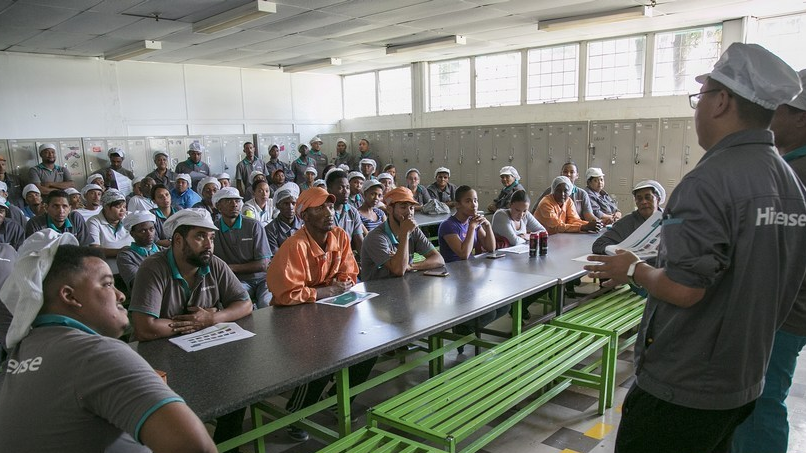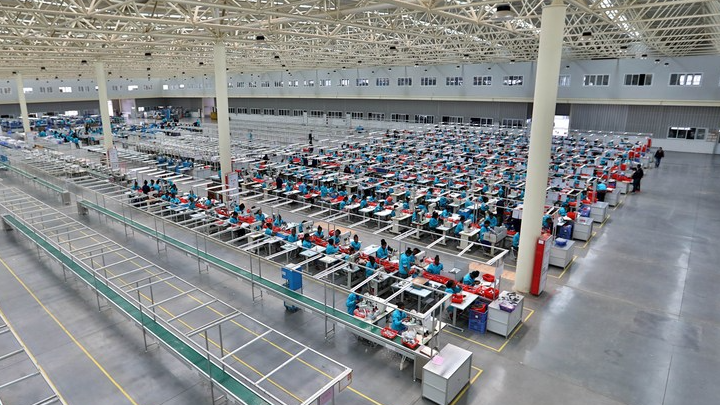
Workers take a training course at a Hisense plant in Atlantis near Cape Town, South Africa, March 18, 2019. /Xinhua
Workers take a training course at a Hisense plant in Atlantis near Cape Town, South Africa, March 18, 2019. /Xinhua
Editor's note: Stephen Ndegwa is a Nairobi-based communication expert, lecturer-scholar at the United States International University-Africa, author and international affairs columnist. The article reflects the author's opinions and not necessarily the views of CGTN.
The partnership momentum between China and Africa has picked up steam, practically Siamese twins in forging ahead with trade and growth. It is now almost impossible to separate the two economically without fundamentally affecting their growth.
But while commercial and diplomatic institutions have largely pushed bilateral cooperation, private Chinese companies have taken on a growing role in the continent.
A report released on August 26 in Beijing, "Market Power and Role of the Private Sector: Chinese Investment in Africa," published by the China-Africa Business Council, documents the two-decade economic cooperation between the two partners. The paper covers the history of Chinese enterprises in Africa – from their beginnings in the continent to their current role in the African countries' socio-economic front. The 136-page report also highlights the challenges in Sino-African investment cooperation during the period under review.
Chinese enterprises have made meaningful presence in Nigeria, South Africa, Egypt, Angola, Zambia, the Democratic Republic of Congo, Ethiopia, Kenya, the Republic of the Congo, Ghana, Algeria and Tanzania. They are bound to delve deeper into the continent through the Belt and Road Initiative which will open ancient international trade routes.
Chinese enterprises will play a crucial role in the growth of the African Continental Free Trade Area or AfCFTA, the continental trading bloc that was launched in January 2021. Chinese enterprises are expected to plug into the vast business opportunities that AfCFTA offers. China can also tap into this platform to explore the massive potential in the continent's services sector.
Significantly, the launch of the report comes in the background of the 2021 Forum on China–Africa Cooperation or FOCAC, to be held in Dakar, Senegal. African countries look to more Chinese commitment in the growing relationship. Since FOCAC started in 2000, Sino-Africa trade has grown twenty-fold. Between 2000 and 2019, trade between China and Africa was over $200 billion.

People working at Huajian Light Industry City in Addis Ababa, Ethiopia, June 12, 2019. /Xinhua
People working at Huajian Light Industry City in Addis Ababa, Ethiopia, June 12, 2019. /Xinhua
Similarly, China's infrastructure investment in Africa's energy sector is paying off. As Africa's urban population continues to grow the energy demand for household consumption and industrial production in urban areas is also increasing. This has prompted infrastructure investment to upgrade the production and distribution of energy in the region.
According to the International Energy Agency, access to electricity in Africa doubled from 9 million people a year between 2000 and 2013 to 20 million people between 2014 and 2019. With currently around 580 million people without access to electricity in Africa, a decline from 610 million people in 2013, this progress is largely attributed to contributions from only five countries: Ethiopia, Ghana, Kenya, Rwanda and Senegal. All these countries are benefiting from Chinese infrastructure investment in the energy sector. Highlights of a report (2016) from the International Energy Agency show that Chinese companies that operated as the main contractor were responsible for 30 percent of sub-Saharan Africa (SSA)'s new energy capacity additions between 2010 and 2015.
While China is committing colossal resources to develop infrastructure across countries on the continent, it is important to note that these investments are not limited to energy and transport. China is also the only foreign country with the largest infrastructure investment in Africa's information and communications technology (ICT) sector. By continually strengthening ICT infrastructure development in Africa for several decades, China has demonstrated a strong commitment to developing the continent's ICT sector. It is therefore not a fluke that Africa is currently the epicenter of the world's mobile money industry – a feat the continent could not have attained without China's enormous investment in the ICT sector.
A report (2021) from the GSM Association indicates that SSA has been the central point for the global mobile money industry for more than a decade. By the end of 2020, there were 548 million registered accounts in SSA, the region contributing 43 percent of the world's total new accounts in 2020. Considered as an essential resource in Africa, mobile money is bolstering access to financial services, closing the gender gap, mitigating inequality and alleviating poverty. Through mobile money, both men and women in Africa have equal access to financial services. Mobile money has enabled women who could not access the services of traditional banks as a result of inadequate documentation, travel distance and cost barriers to make or receive payments and save and insure against risk. Mobile money services in Africa have proven to be a critical tool for promoting shared prosperity and fostering inclusive growth, particularly in SSA, where the largest proportion of the world's poorest population is located.
By subscribing to mobile money services, low-income households are not easily pushed into poverty during an economic downturn or loss of a breadwinner because they can access credit, and save and insure against risk. Also, through mobile money, low-income households in the region are able to access basic utilities such as healthcare, education, clean water and energy.
Admittedly, these achievements which align with the United Nations Sustainable Development Goals could not have been attained without China's commitment to developing infrastructure in Africa. As the saying goes "a friend in need is a friend indeed." China exhibited an unflinching commitment to close Africa's giant infrastructure gap when there was limited support from the rest of the world. It is therefore important for African countries to cooperate with China, which has the technical expertise to develop the region's infrastructure in a problem-solving process to achieve sustainable and inclusive urbanization.
(If you want to contribute and have specific expertise, please contact us at opinions@cgtn.com.)

